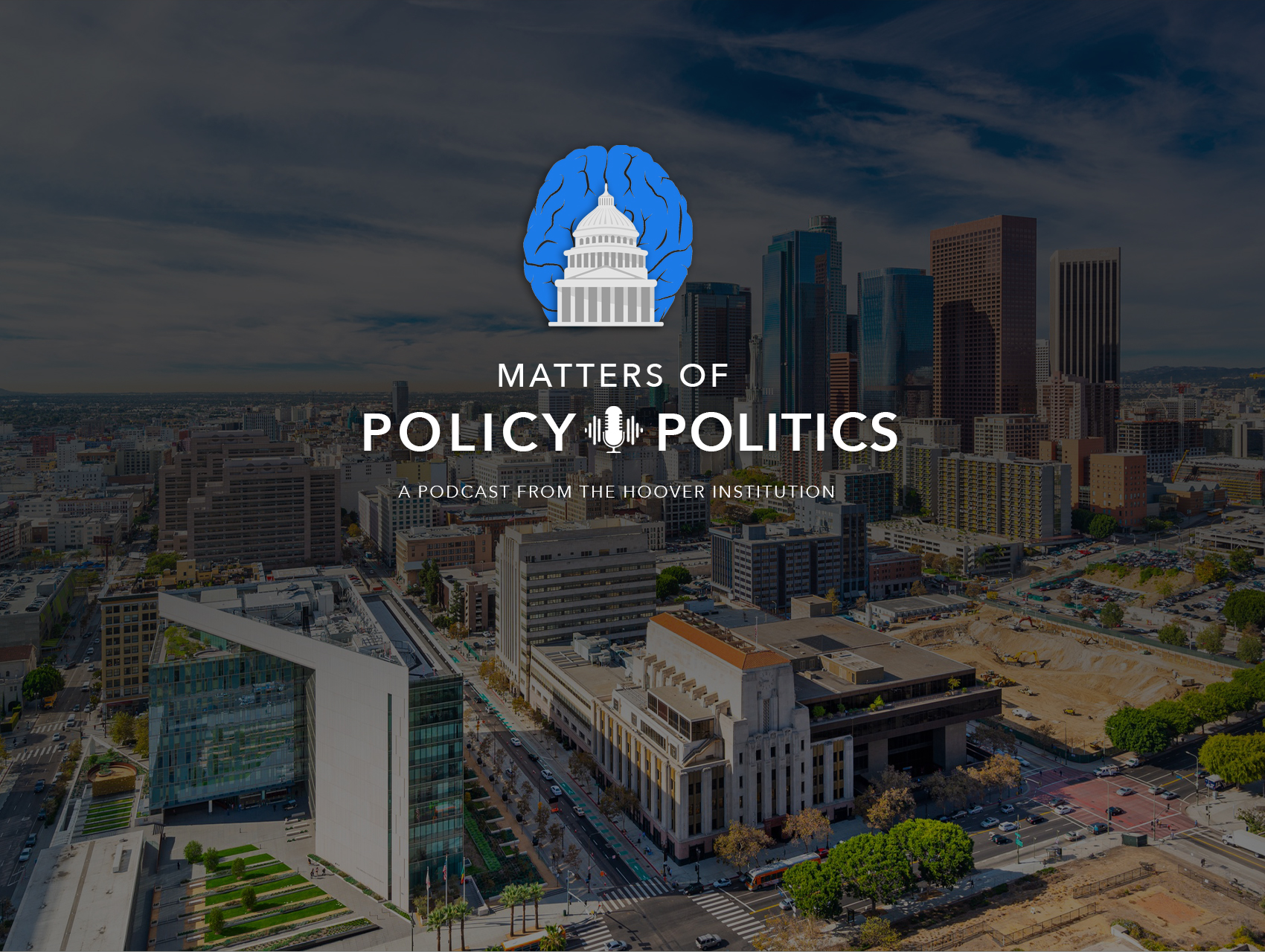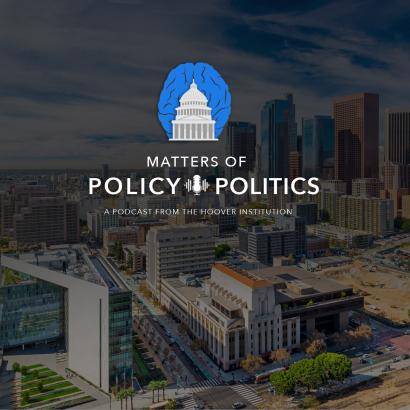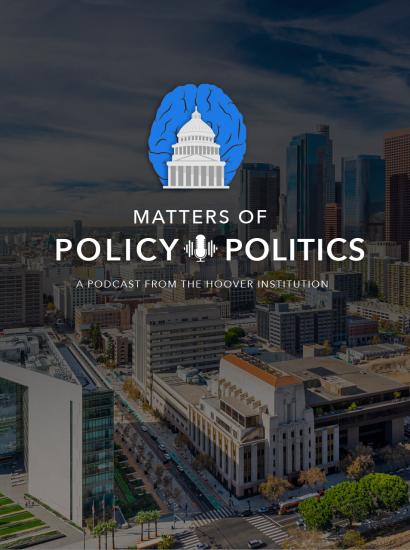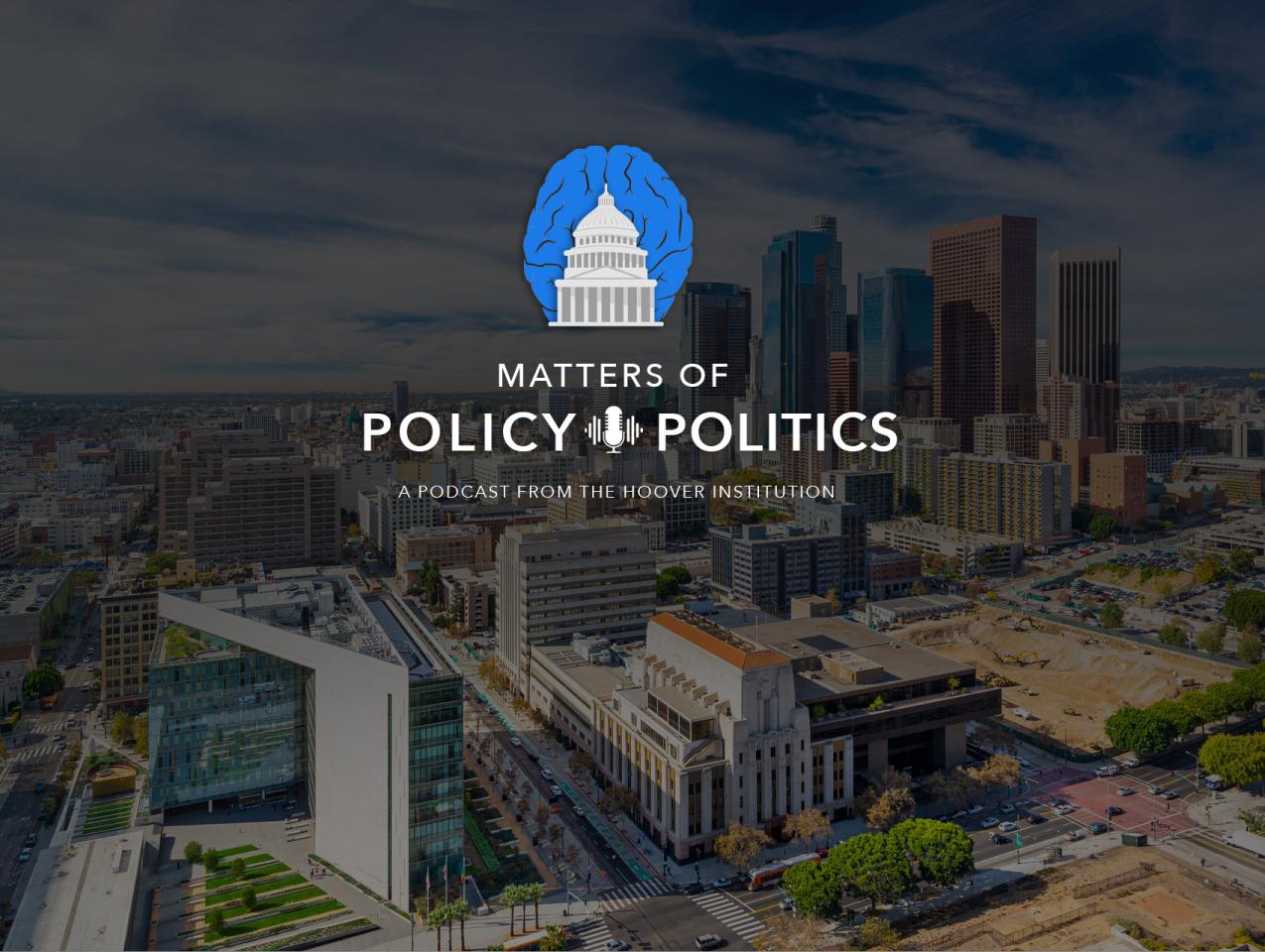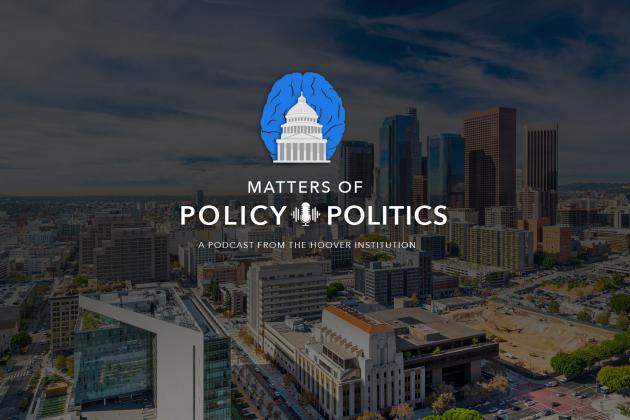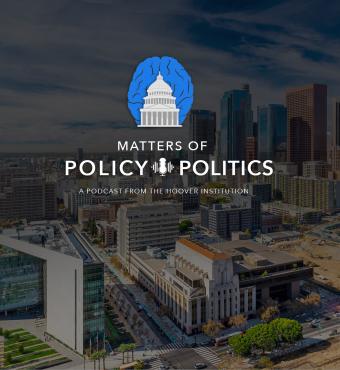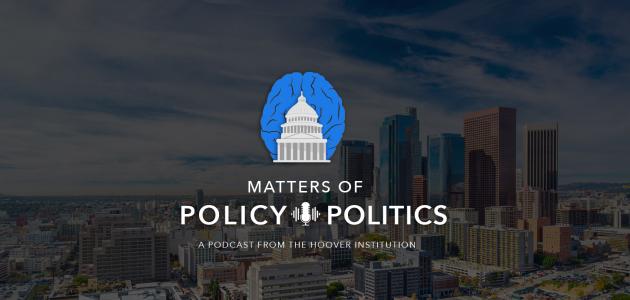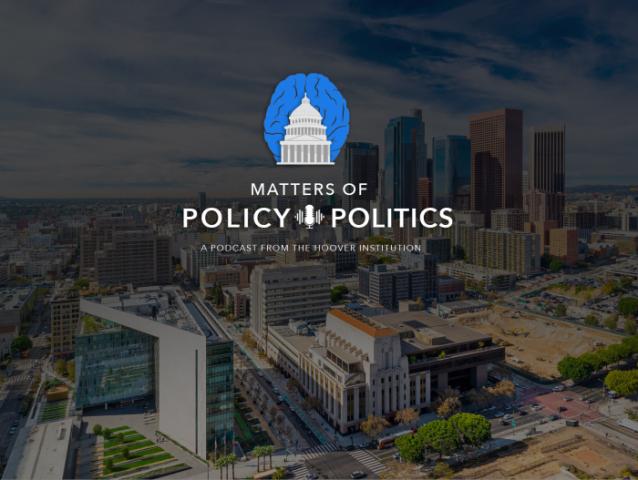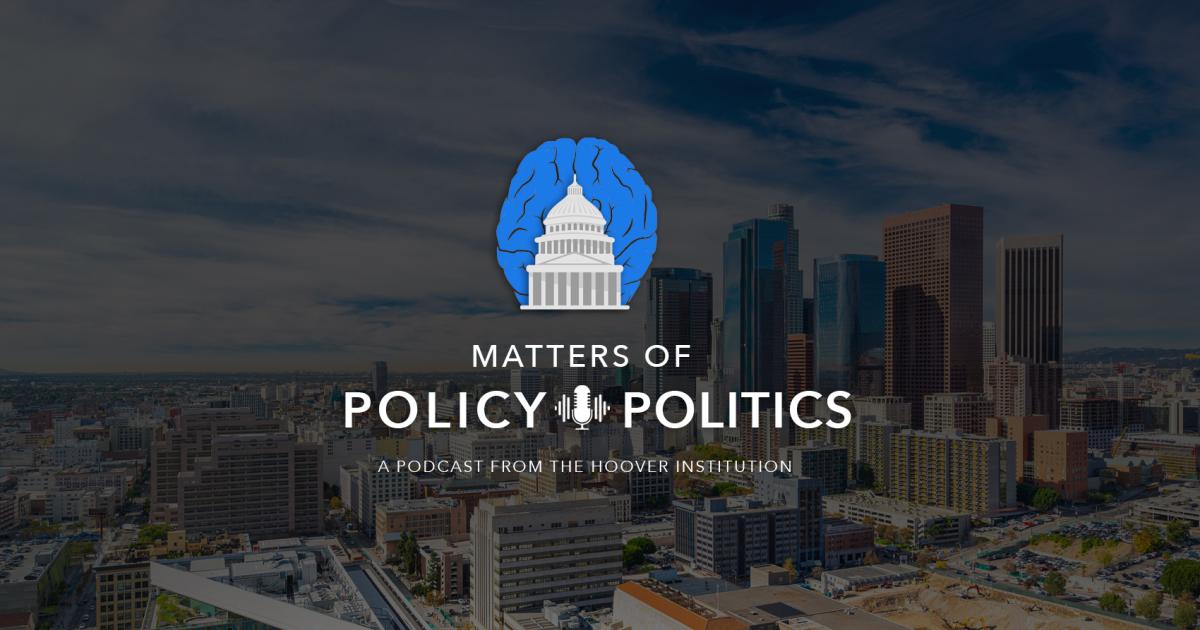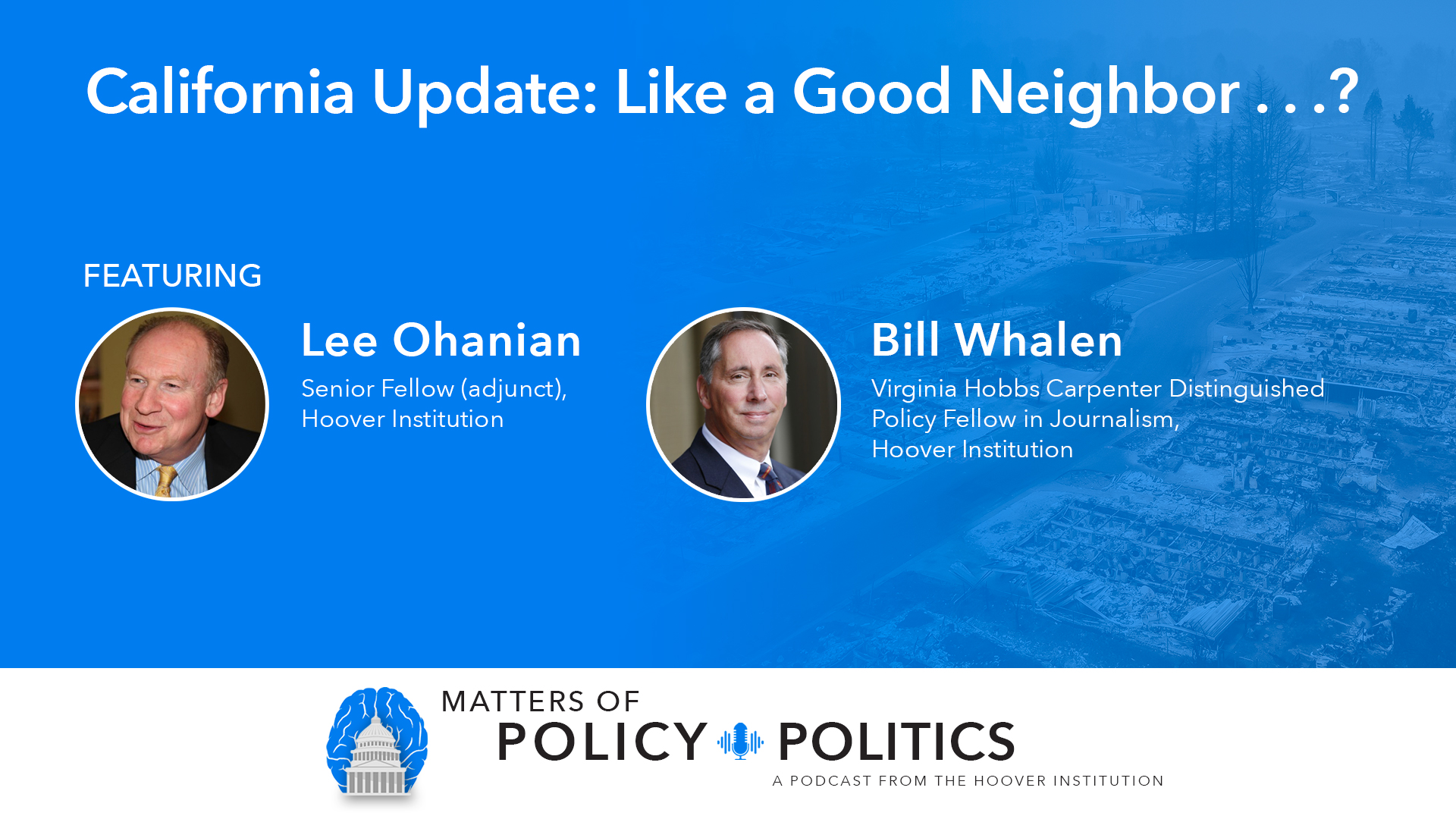- State & Local
- Politics, Institutions, and Public Opinion
- Empowering State and Local Governance
Los Angeles confronts the grim reality of a multi-year effort to clean up and rebuild after its devastating wildfires; Governor Gavin Newsom makes a big disaster-relief ask in Washington, and intrigue abounds in next year’s gubernatorial race. Hoover Institution senior fellow Lee Ohanian and distinguished policy fellow Bill Whalen, both contributors to Hoover’s California on Your Mind web channel, join Hoover senior product manager Jonathan Movroydis to reflect on a smarter approach to fire response and prevention and what the future holds for swift reconstruction and affordable property insurance. They also discuss whether former vice president Kamala Harris is a shoo-in if she runs next year to succeed Newsom, plus the contrast between how red and blue states court industries (Tennessee luring In-N-Out investment and Newsom wanting to double Sacramento’s largesse for California’s struggling film industry).
Recorded February 26, 2025.
WATCH TO THE EPISODE
>> Jonathan Movroydis: It's Wednesday, February 26, 2025, and you are listening to matters of policy and politics, a Hoover Institution podcast devoted to governance and the balance of power here in America and around the free world. I'm Jonathan Movroydis, Senior Product Manager at the Hoover Institution, and I'm sitting in the chair of Bill Whalen, the Virginia Hobbs Carpenter Distinguished Policy Fellow in Journalism.
So that he can answer questions and provide commentary about California policy and politics in which he is well versed. Bill Whalen, in addition to being a Washington Post columnist, writes weekly for Hoover's California on youn Mind Web channel. Whalen is joined today by Lee Ohanian Hoover Institution Senior Fellow and Professor of Economics and Director of the Edinger Family Program in Macroeconomic Research at the University of California, Los Angeles.
Ohanian also writes weekly about the policy environment of the Golden State for California on your Mind. Good day gentlemen, let's talk about the latest developments in policy and politics in the Golden State. Let's start this episode with discussing Lee's column last week for California's on your mind. Lee, you deal with the Golden State's challenges with wildfire prevention and containment.
You provide a startling explanation of wildfire's impact on carbon emissions. Quote, there is a veritable laundry list of expensive programs the state has implemented to address climate change the cap and trade program, the low carbon fuel standard, the zero emission vehicle mandate, which requires automakers to produce a minimum level of zero emission vehicles.
The Renewal portfolio standards requires utilities to produce a minimum percentage of electricity from renewables, electrification for cargo handling equipment at ports, green building codes and public transit electrification, including the state's high speed rail program. Yet all the carbon emissions reductions achieved from these and other programs between 2003 and 2019 were offset by the carbon emissions from California wildfires in 2020 alone.
You also describe California's long history of wildfires, but as you know, nine of the 10 largest fires in the history of the state occurred since 2017. Lee, why are the impacts of these fires seemingly worse today? Is this a matter of bad environmental conditions or just bad policy?
Is there any hope that the state will adopt common sense solutions for fire prevention, detection and protection?
>> Lee Ohanian: Well, Jonathan, the first order of business for state and local government is to protect its citizens. And wildfires have been a part of California seemingly forever. So the column you referenced describes how there were descriptions of Santa Ana winds, which are the very dry, very strong winds that come out of the desert that often create conditions that are conducive for wildfires Their description of those winds that go back to 1847 that were described as hurricane like, and that was before, obviously before the state became part of the Union.
So we've been dealing with this for as long as the state's been in the Union. And what is very concerning is that the priorities are apparently, seemingly, at least to me, are not being given to wildfire prevention, prevention and wildfire protection. But the point about climate change is that the state's all in on dealing with climate change and carbon emissions.
And as you noted, we have a long list of programs to address carbon emissions. And yet the carbon emissions from California wildfires in the year 2020 alone, just that year, were more than twice as much as the carbon emission reductions that the state achieved cumulatively between, I believe it was 2003 and 2019.
So when you look at a statistic like that, the state really should look at that and think, my goodness, everything we've done in a 16 year period has been completely offset by our wildfires by a factor of two. And that was just in the year of 2020. We've had many other severe wildfire years, including 2018.
So that really just puts to the forefront the need to deal with wildfires in the state. And what we saw during the LA wildfires is I think, really unacceptable. There was inadequate water pressure to fight the Palisades fire, a 117 million gallon water reservoir in the Pacific Palisades that was constructed shortly after the Bellair fire of 1961.
At that time, the city recognized just how important protection and prevention was. So that reservoir was built after the 1961 Bel Air Fire that had been empty for nearly a year. And it was empty for nearly a year because its cover was waiting to be fixed. So that really is just playing Russian roulette to let a reservoir of 117 million gallons sit empty in an area with just enormous fuel for fire.
So there's all sorts of things that can be done, including the obvious ones, such as expanding fire investments in fire personnel, fire engines. The columns I wrote over the last month indicate that the LA Fire Department did not pre deploy fire equipment fire engines in the Pacific Palisades before that fire.
And apparently there were 1,000 firefighters who could have been called in prior to the fire starting. So this just really highlights the best decisions are not being made. So when you ask, will common sense prevail, we all certainly hope so. We lost 29 lives in the LA fire.
In the Eaton fire, ewve lost many more lives than that over the last few years during wildfires, and it's remarkably sad and remarkably tragic. And California as potentially the most innovative, technologically innovative state in the country, we really need to be thinking outside the box and doing more.
There's all sorts of developments in artificial intelligence and machine learning that in my opinion, could be leveraged to identify fires before they burn out of control. For example, the Palosaves fire was called in by residents, right? If it had been identified earlier, then, then you can get these things under control.
So it's, I think, a very tragic and sad day for us when this happened last month.
>> Bill Whalen: So Lee, it seems to me when California reaches a situation like this, you got one of two roads to take. One is you can throw a lot of money at the problem.
And we're going to talk about a lot of money in a minute in terms of what the Governor wants out of Washington in the way of help for the recovery for Los Angeles, almost $40 billion in aid they're asking for. But there's also the question of making government smarter, Lee.
And it seems to me that you can throw all the money in the world at this situation, but if you don't make the states smart harder at how it goes about these things, you're going to be back to square one, as always, when fires break out. So you've written a lot about this, Lee.
How would you make government smarter in this situation?
>> Lee Ohanian: Well, I think at some level we need political leadership that's going to prioritize what government is supposed to do, which is to protect us. It's just obvious to me that that has not been a priority. When you look at the LA city budget in the most recent fiscal year, I believe approximately 6% of the budget was devoted to Fire.
And I went back, went back a couple of decades and looked at the budget from about 20 years ago, and that budget had over 8% of the budget allocated to Fire. Now, it turns out those 2 percentage points are very important because the LA city budget is very, very big.
So what that means is that if we had just maintained the share of the budget that was allocated to fire in 2020, in fiscal year 2024, 25. As we had 20 years ago, there would have been millions, millions, tens of millions more dollars available for fire, which would have meant more firefighters, more equipment.
We wouldn't have had this lack of personnel that, in my opinion, was a contributing factor to the fires getting out of control. So we need to put, safety has to be the number one priority. And I have concerns about whether the current political leadership in places like Los Angeles just have the ability to do that.
So, in my opinion, I think the first sort of business is we need people who are going to prioritize what people really need here, and that's public safety.
>> Bill Whalen: Yeah, so again, we can put a lot of money into fire prevention or at least fire responses, put more firemen on payrolls, have better infrastructure and so forth.
But I think we have to address the root causes of the fires, which gets into questions of land management, leaks. But one which I'd like to address here briefly, which is the homeless situation in Los Angeles, because you have homeless encampments across Los Angeles, many of them under freeways.
There was a fire a couple years ago in Los Angeles, probably caused by an encampment under a freeway. Homeless people go out in the wild as well, can start fires out there as well. So this gets the idea though of more sensible government and that, well, you have to address root causes.
And one of the problems here is the homeless population in Los Angeles, which is a big part of Mayor Karambass's agenda. Something she's made a point when she got elected, she was going to handle the homeless problem once and for all.
>> Lee Ohanian: Yeah, homelessness is an important issue.
What the piece I wrote indicates some statistics about homelessness, and the contribution of homelessness to fires in Los Angeles. And I believe over 50% of fires in Los Angeles, I don't recall the exact year, were due to homeless. And that includes the homeless tapping into electricity lines which then obviously spark, and cause fires.
And Mayor Bass said she was going to deal with homelessness, the needle hasn't been moved in Los Angeles. The homeless numbers now, are about the same as they were, as I recall, around the time she took office. And moreover, Bill, when you talk about kind of throwing money at problems, California has not been very effective at the investments we made in homelessness.
Between, I believe was fiscal year around 2019 to 2000, that please the 1819 to 23, 24 fiscal years, that five-year period, the state spent 24 billion on homelessness. Right, 24 billion, and the number of homeless increased substantially during that period. The state auditor reviewed some of the programs in California regarding homelessness and issued, I think, what can't be called anything other than a scathing report indicating that not enough information was being collected.
The accounting was inadequate for the expenditures, and California simply isn't in a position to understand what programs are working well. It's hard to know where the money's going. And the same thing, a similar thing happened in Los Angeles with I think over $100 million being that wasn't even spent on homelessness, that was allocated in a previous fiscal year for LA city budget, but wasn't even spent.
So, I think the LA political leadership, I think is in over their heads. I think we've seen that when, sadly, when crises hit, it really tests the mettle of political leaders, can they bring people together? Can they make decisions on the fly that turn out to be sensible?
I think what we saw here, is political leadership that it's hard for me to find words for this, that simply really didn't have any idea of what to do. Mayor Bass got off a flight, she had gone to Ghana, she turned around and came back. I think that's probably a 12, or 13 hour flight.
And when she got off the plane, she was asked by reporters about what her plan was and what was going to, you know, how we were going to save Los Angeles. And I don't believe she uttered one word. She didn't,
>> Lee Ohanian: She had 10, 12, 14 hours to communicate with her staff, with people in Los Angeles and there was simply, there was simply no plan as far as I could tell from her not answering those questions.
So, Bill? Yeah, I think we do, we have big budgets in the state, we have a big budget in Los Angeles. And you look at what's happening, and it's just hard to square that with the public, the public safety outcomes we're seeing now.
>> Bill Whalen: So, Lee, speaking of leadership, Governor Newsom on Friday sent a letter to congressional leadership asking that the fed send California $39.68 billion in aid to help Los Angeles recover.
I won't go through the entire list of what all 39.68 billion gets you, but long story short. It includes about $5.29 billion to provide low interest loans to businesses, nonprofit organizations, $4.32 billion for business grants, $2 billion for low income housing tax credits, and leave $5 billion for debris cleanup.
Now, this is going to be very interesting to watch how this moves or does not move through Washington. A Republican Congress At Washington, which is looking at spending in general, maybe not at first blush wanting to send $40 billion to California, but political reality means it'll send something.
It would seem to be leaded the first, maybe the smart approach for Congress would be to do this, number one, obviously go through this, this relief package with a fine tooth comb, and examine what $39.68 billion comes up to. I'm always a little leery, by the way, when you get something that comes in just under something with the zero on the end, it's kind of like selling a product to you for $99.99, because why it looks better than $100.
But I think two things, Lee, they obviously need to go through the line items here, but secondly, they should probably fast track the $5 billion for debris cleanup. Because if you look at Los Angeles right now, Lee, this seems to be the paramount issue for everybody wants to clean up.
And here, you have a choke point problem in Los Angeles. It's a combination of two things, one is where are you going to park the dirt? And the other one being how long will it take to inspect the debris to make sure that it's clean so you can take it away, asbestos issues and so forth.
So, I don't know, what do you think, Lee, is debris cleanup issue number one here?
>> Lee Ohanian: Yeah, 100% estimates are as long as 18 months for the debris to be cleaned up. And Bill, ironically, in December of last year, so about a month before the, before the LA fires, Mayor Bass gave a press conference celebrating all the green investments that Los Angeles had made.
How many workers there were in green energy industries, and the number of EV electric vehicle charging stations that the city had had put in. And, you know, just getting back to the idea about what is the priority, those should not be the priorities ahead of fire protection. And we saw that at some level they were.
When you look at debris cleanup, Bill, ironically, you know, there's more EVs in Los Angeles than any other city. Pacific Palisades is an area of relatively high household income. I don't have any numbers on this, but I suspect proportion of electric vehicles in Pacific Palisades are probably higher than most other places in Los Angeles.
And what happens when a Tesla gets caught in an inferno is you've got all those batteries and those batteries have a lot of elements that are toxic. So, ironically, what was supposed to save the climate, electric vehicles, is now creating toxic waste throughout Pacific Palisades. The EPA has to go in there and yes, where are they going to park that?
Where are they going to park that toxic dirt? Maybe, somewhere in Nevada, potentially. But it could, the estimates are 18 months. When it comes to government work, I rarely see something being done under a timeline. So if you go over time, then you're looking at greater than 18 months.
So yeah, it's priority number one, it's going to take a long time. And it's interesting, Governor. Yeah, it's obvious Governor Newsom would be asking for federal support. Now, Karen Bass fired the LA fire chief a couple of days ago, and essentially for, incompetent performance, including not deploying more firefighting resources.
So, with that happening, I think Congress is going to say, you want us to pay for the, the policy mistakes that are occurring in your state. That's a little different from saying, you know, the hurricane came into Florida. Florida did everything they could to protect their residents and now we're going to help them out.
That's very different than saying, whoops, we didn't do the right things to protect the people who are coming from here.
>> Bill Whalen: Yeah, you mentioned 18 months for debris, Lee, the timeline here fascinates me. So, Mayor Bass the other day gave a timeline for getting all of this done and she said anywhere from three to five years, which, you know, five years, your eyes kind of bug out.
But that's interesting number when you think about it, Lee. I looked it up, it took about four years and four months to construct the Golden Gate Bridge. So maybe, we can say in modern day California, it's parallel to that, if you will. But what's going on three years and a few months from now?
The Olympics are coming to Los Angeles, the world is coming to Los Angeles. So, this is another wrinkle to this conversation. While a Republican Congress might reflexively want to make life difficult for California, here it is, your Olympics. Unless, some wild eyed Congressman is going to come up with some scheme to move the Olympics to Texas between now and 2028.
It is Los Angeles, it is America by default. And so, it is kind of in your vested interest as a member of Congress to want to get LA cleaned up faster, rather than later, because otherwise you're looking at an eyesore and ultimately kind of embarrassment for the country.
>> Lee Ohanian: Yeah, it reminds me a little bit of San Francisco, I know a year or so ago when they hosted the
>> Bill Whalen: APEC summit when, Jinping was coming to town.
>> Lee Ohanian: Yeah, yeah. And, interestingly, all the homeless were, were shifted to other places, including down to Silicon Valley.
So Bill, the Palisades are, they're far enough away from most of the Olympic venues that I don't think a ton of people would be that they're not going to be front and center. But yeah, it does raise the question of what are you going to do with the Olympics.
And I think No matter how much money you throw at it, you simply, you know, feasibly, you can't get it back to what it was looking for a very, very long time. So, even in the best case scenario, you're still going to have the Palisades and the Altadena Pasadena areas.
They're still going to be, have to be cleaned up, and Bill, you know, I used to live in the Palisades and a number of my friends lost their homes, a number of others didn't lose their homes, but now, really can't live there. And many of them that who still have a home are saying, you know, there's just an incredible amount of smoke damage.
My insurance doesn't cover smoke damage. I'm getting estimates of 50, 60, $70,000 to clean out smoke damage from my home. And even if I can move back there, you know, it's going to be five, perhaps longer years before it's a community again. And they're saying, you know what, I don't really want to go back.
And, of course if they try to sell their home now, they'd have to sell at just an enormous discount. Yeah, LA is kind of stuck between a rock and a hard place, and yeah, I agree. I think Congress is going to push hard on Newsom, and at the end of the day, LA is scheduled to hold the Olympics.
And what I wonder about is in 1984 we had Peter Ubrath running the Olympics and they were, I was in university at that time and, and the city ran beautifully. In fact, there was less traffic on the freeways than, than during normal times because businesses had cooperatively staggered when they were going to open and so forth.
So, you need another Peter, you broth to run this, and you need a lot more people like you broth and in city government. I don't think we have that person now. I hope they can find that person, him or her. Right now, I don't see that person.
>> Jonathan Movroydis: Gentlemen, in the wake of the fires earlier this year, there's been nearly a dozen insurance related bills proposed in Sacramento, including legislation that is not so Insurance friendly.
Such as forcing payers to pay homeowners 100% coverage, though itemizing losses allowing fire victims to sue entities supposedly complicit in climate change. This is Senate Bill 222, according to the California center for Jobs and the Economy. This bill would turn climate policy into climate litigation. The center says it would increase California residents cost of living on fuel, electricity and everyday goods.
Quote, gasoline could jump 63% to $7.38 per gallon to diesel 69% to $8.23 per gallon, and electricity rates could rise up to 55% for industrial users. Meanwhile, the state's insurance fund is broke and the private insurance market is murky in the wake of recent fires. California's insurance commissioner, Ricardo Lara denied State Farm Insurance's interim rate increases, which prompted the company to reply in a letter to Lara, quote.
This lack of approval sends a strong message to State Farm General about the support it will receive to collect sufficient premiums in the future to protect Californians against the risks of loss to their homes, property and other claims. State Farm General must seriously consider its options with the California insurance market going forward, unquote, as State Farm claims.
Lee have Sacramento's decisions weaken the protection of Californians against the risk of future property losses?
>> Lee Ohanian: Jonathan, going back to what we've experienced in the last few years, just remarkably large, large wildfires destroying a lot of structures, killing many, many people. We have a situation where insurance companies are looking at California and, and they're looking at enormous losses.
And one reason is because we saw during the LA fires there simply is inadequate fire protection, and inadequate fire prevention. Regarding fire prevention the recently fired LA fire chief, not so long ago said, I need a budget to have. I believe she indicated, I don't remember the exact number, but two crews, let's say two crews for full-time brush removal and in brush removal had been being conducted by volunteer teen crews.
So, when you read something like that you just ask yourself, well yeah, of course we need to have brush removed, and of course it needs to be professionally done and, and by people who are staffed by the fire department. So you, why wasn't that happening in a city with a budget of the size of Los Angeles?
So, if you're an insurance company, you're going to look at that and just say hey, they're not doing, I don't think they're doing the basics, which means hazard, fire hazards in California in their mind suddenly have skyrocketed. Nobody ever thought we would see the Palisades become an inferno.
So they're looking, they've got to make a competitive rate of return, and they simply can't do that in California. The way policy has been being conducted now, without charging enormous premiums and at the same time, State Farm, Allstate. Farmers, all of these big companies that had been offering homeowners policies in California, they have to subsidize that.
I mean, they have to help fund California Fairplan, which is the insurer of last resort in California. And the amount they contribute to California Fair Plan is approximately proportional to the amount of business they write on traditional insurance plans. So they're looking at California and just saying this is just gonna be a money pit.
And interestingly, in Just a few days before the Palisades fire, another wildfire broke out very close to the site of the second Palisades fire. No conclusions have been issued regarding the source of that fire, what the cause was. Some believe the, the original fire somehow was rekindled. But in any case, that fire was contained very quickly.
I believe it was on New Year's Eve, about one week before the inferno. What we saw about a week later is a much slower response. A more limited response in terms of when water was dropped on the Palisades fire, according to one eyewitness. So if you're an insurance company, you're thinking, I've got to have enormous premiums to make it, to make it worth my while to do business in California.
And the state's just gonna have to realize that. And either we lose insurance, or we have to allow them to charge much higher premiums. But, the best scenario is we get in with those insurance companies and say, you know what? We're going to do a lot better. We're going to do a lot better in terms of prevention and protection.
So please don't leave our state.
>> Bill Whalen: Yeah, let's go back to the notion here of SB2, 2 and the idea of allowing fire victims to sue entities complicit in climate change. Complicit gives you an incredibly wide umbrella leaf for who's related to climate change. You can say oil companies you want to find.
You could say construction companies, you could say manufacturing companies, retail companies. Lee, this just sounds like a bonanza for trial lawyers, plain and simple. I just wonder, I wonder how long in California before we're going to actually have people going to law school specializing in lawsuits related to climate change.
How long before you going to see on daytime television lawyers advertising not for auto accidents and claims, but climate change as well? I'm being a little sarcastic here, but, you know, years ago, we had a, a ballot measure back in the mid-1990s, it was a shareholder lawsuit initiative.
And this is one of the first measures in California that really got the tech community up in arms, because why? This initiative would have allowed Lee Ohanian, as a shareholder in the company, to sue the company in effect if its stock prices went down. And of course, the tech world looked at this as, you know, tech companies always have, you know, fluctuating stock values.
They thought, God, we can't stay in business. This happens. Well, this sounds like a death blow to insurance as well. And Lee introduces the new double whammy in California, which is, A, can you afford to buy a house? And B, if you're so lucky as to afford to buy a house, can you afford the insurance?
>> Lee Ohanian: Yeah, yeah, Bill, exactly.
>> Bill Whalen: If you can find it.
>> Lee Ohanian: If you can find it. Yeah. I live just south of Santa Barbara, and my community was affected by a fire known as the Thomas fire back in 2018. It's one of those 10 largest wildfires in California history, measured as acres burned.
You know, Bill, interestingly, a lot of people in my community lost their insurance. My premium rose by a factor of three after the Thomas fire. And I certainly understand why. It's because I now live in an area that insurance companies perhaps thought was much safer. And there was gonna be much better protection than apparently there was.
And Bill, the idea of trying to sue for climate change, I just, based on my limited knowledge of the law, I suspect there'd be a lot of summary dismissals about this. It sounds a lot more like policy than, than a well defined lawsuit. Do you sue the Exxon Mobil?
Do you sue cement companies? Producing cement creates an awful lot of carbon emissions. Which carbon emissions were responsible? Were they ones that, that happened here in California? Were they ones that happened to China? China now is responsible for, I believe, close to 25% of the world's carbon emissions.
Yeah, I think this is just barking up the wrong tree. When threats become large, government invests to deal with those threats again. That's just the first order of business and that's not being effectively done in the state, in my opinion.
>> Bill Whalen: Well, for an insurer in California, Lee, it's going to be like the old show let's make a deal in door number one and door number two, and door number three.
Door number one is going to be, well, let's settle out of court, just avoid the hassle of this. Door number two, we'll fight them in court. We'll lawyer up and we'll take Lee Ohanian, and we'll go up against me and I'll just bleed Lee Ohanian. But door number three, we're just not going to deal with California altogether.
We're just going to walk. And this has been the trend you've been seeing in California for years now. The insurers are just getting out of here.
>> Lee Ohanian: Yeah, insurers are getting out of here. Energy companies are very concerned about doing business in California. Our refinery capacity in California has declined over the decades.
And California uses a particular blend of gasoline that's not used in other parts of the country due to our low carbon fuel standards. So policy message is clear to energy companies. We'll allow you to stay here because we sort of need you. But we're going to try to squeeze you on this.
And yeah, insurers may just want so again, if they do not get the rate of return required in terms of the investments that they're for their shareholders and the people who invest with those insurance companies, they're going to go someplace else. It's just the most basic economics. And California can complain and try to tax them and try to sue them, they're just not gonna be around.
>> Bill Whalen: One last question, Lee, and I know Jonathan wants to segue to the next topic. One last question for you. If you want to drive an automobile in California, you have to have proof of insurance. But if you own a home in California, you don't have to have proof of insurance, you don't have to have to have insurance at all.
But the problem with that, if you don't have insurance is what happens when your house burns down? You turn to the state for insurance, perhaps if you want to, the next time around. So question, Lee. Should California require homeowners to have insurance or not?
>> Lee Ohanian: Well, my understanding is that homes with a mortgage, the lender does require some level of homeowner's insurance.
I do not know how much that is. But those who own the home free and clear don't have to have home insurance. But Bill, you bring up an important point because I don't know the number of people who own their home free and clear. But yes, they can come to the state and say, my goodness, my house burned down.
I have no insurance. What do I do now? So that imposes a burden on state taxpayers. And again, the issue comes up is, well, should I be subsidizing someone who decided to self insure, take that risk. If you self insure and take that risk, then, you shouldn't be coming and asking us to pay for that.
And at some level, it kind of boils down to Congress looking at California and seeing a city that didn't do the right thing and they fired their fire chief and saying, okay, so you want us to pay for a mess that maybe could have been prevented. Realistically. Could have been prevented.
Because, look, you just fired your fire chief saying that a thousand firefighters could have been on the job here. Two or three hundred of them could be in the Palisades. That wouldn't have happened. And we wouldn't be having this conversation.
>> Bill Whalen: It would be, it would be out of character for the legislature to embrace the marketplace, but it has to embrace the marketplace in this regard.
When you have insurers leaving California, people who want insurance turn to where they turn to the state fund for insurance, which has two flaws. Number one, it covers, I think, up to $3 million for your home. And in the Palisades, $3 million doesn't get people very far, some people at least.
But secondly, that fund's running out of money and there's just not enough money to go around as people keep flocking into it. So California is going to have to find more money for it. If you look at the state budget right now, we, we don't have money to go around like that.
So again, the states are going to have to find a way to rejuvenate the marketplace, plain and simple.
>> Lee Ohanian: Yeah. The UCLA Anderson Business School Forecast project, I believe, estimated somewhere around 150 billion in property losses for the state, something along those lines. And one of my columns cites another estimate of losses, including economic losses, the loss of life and so forth, I believe around $250 billion.
Yeah, this is off the charts. Yeah, again, it's like the the state budgets was under tremendous pressure even before, even before January of 2025.
>> Jonathan Movroydis: A new poll is showing Kamala Harris as the overwhelming front runner in the 2026 California gubernatorial elections, with 57% of respondents expressing support for her candidacy.
Bill, you write in California on your mind that week, how formidable would Harris be should she sets her sights on Sacramento? Look no further than this Emerson College polling slash inside California Politics and the Hill survey. Harris checks in with 57% support, as I just mentioned, six times better than former Congresswoman Katie Porter with 9%.
The rest of the pack is at 4% apiece, Lieutenant Governor Eleni Kunalakis and former Los Angeles Mayor Antonio Viragosa. Meanwhile, 17% of the electorate was undecided. Bill, if she does decide to indeed run for governor, does that mean she would likely have to skip out on a presidential contest, being that she was just elected to Sacramento?
You write that there is some precedent. Please explain.
>> Bill Whalen: Well, the president would be somebody who you're familiar with, and that would be Richard Milhouse Nixon. Jonathan who of course runs for president in 1960, loses, and in 1962 runs for a governor of California and loses. But that's not the end of the story for Nixon.
As we know, McConnell is in a very different situation in several regards. Number one, it's an open race in 2026. Gavin Newsom is term limited. He can't go again. So the seat is there for the taking whereas Nixon in 1962 ran against Pat Brown, Jerry Brown's father. But this field is just wide open in this regard, 57% is a staggering number.
It suggests that unless she just has the mother of all collapses. I hate to match what would happen to her to cause her to go down so far as to not finish first or second in the open primary. She would finish first or second. If she were to draw a Republican as her opponent, she would win easily.
If she were to draw a fellow Democrat, she'd probably still prevail just based on, you know, her standing in the party, her own formability in that regard. But what got me to thinking about this was, okay, if she wanted to have both her cake and eat it too, run for governor, then turn around and run for president.
And here I looked at Jerry Brown, who did this twice, 1976 and 1980. Brown comes to office in 1975, and he does run for president, but he doesn't run Lee and Jonathan until March of the following year. He has waited for the Democratic field to play out a bit.
Jimmy Carter is now the front runner. The party is uneasy about Jimmy Carter, people like Hubert Humphrey and Scoop Jackson and others are kind of circling around at the thinking about getting in. And Jerry takes the plunge, makes himself basically a favorite sun candidate in California, and runs to several other primaries.
The primary process back then, by the way, was much more backloaded, much more action in March, April, May and June than in the current situation. So Jerry could run now, obviously he didn't get the prize. The problem for Kamala is everything's on a faster pace in presidential politics these days.
If, when she ran in 2019, she announced in early January of 2019 and other Democrats were getting in at the same time as well. If she were to do the same in 2027, announcing in 2022 that year that she's running for president, well, she's taking the oath of office as governor in the first few days of the month, and then you're going to tell me two, three weeks later, she's going to announce for president.
No, that just can't happen. So the only feasible scenario for her doing this, if she does run and become governor of California, she would have to wait and let the process play out like Brown, and she would have to bank on chaos, and she'd have to bank on some terribly flawed frontrunner who the party was freaked out about.
Perhaps she could then run as a favorite daughter candidate, or whatever the proper terminology would be, given her gender, and play it from there. But, people like me every four years write about this stuff, and we like to talk about the open conventions and favorite sun candidates, blah, blah, blah.
And it never pans out, so the answer to your question is no, she can't do both, I don't think. But the more intriguing question, Lee and Jonathan, is this, is she the right person for the job? And here I have two concerns they're not partisan concerns, but I think they're legitimate concerns in this regard.
One, there's nothing to suggest that she is a wonk, that she really is fueled by policy, which California governors have to be because it is a walk job. You're just dealing with policy 24, 7, around the clock. Secondly, she has a terrible record in terms of staff retention.
And I worked for Governor Pete Wilson in the 1990s in California who benefited from staff loyalty. He had aides around him who went back with him for 10, 20, 30 years in politics. And that creates staff loyalty and ultimately presents a better operation. But I don't know, Lee.
I just look at her running for governor. She's obviously processing a lot right now. She just signed a contract with Creative Artists CAA in Los Angeles, which means she'll be giving speeches, maybe she'll write a book. But does she really want to be the governor of California?
>> Lee Ohanian: I can't imagine anyone really wanting to be governor of California, just given the enormous problems that we face.
And Bill, the poll numbers you cited were very interesting. I can't help but just think that those poll numbers are just more about name recognition.
>> Bill Whalen: Yeah.
>> Lee Ohanian: Than really much else. I suspect if you, sample, you walk down the street of any major city in California outside of Sacramento and you ask, hey, who's the lieutenant governor?
I don't think a whole lot of people would know Eleni Kunalakis. Bill, interestingly, I checked her website, and I believe she's received endorsements from Hillary Clinton and former Senator Barbara Boxer, which I thought was interesting. There is Tony Atkins, who is in the state legislature from San Diego.
Again, I don't think anyone outside of San Diego is going to know who Tony Atkins is. There's Tony Thurmond, state school superintendent. Again, I don't think many people are going to know who he is. So you go down that list, and everyone knows who Kamala is, but no one knows who the other people are.
They're going to know who Villa Ragosa is, but I worry that the job is way over the head of your former vice president Harris I believe is over the head of Thurmond Kunalakis has is an interesting story she was in the you know her family's in the construction business her dad is a great rags to riches story that we've seen so many times in this state.
But I believe my understanding is that she's been away from that since the Obama administration when he tapped her for a diplomatic position I believe was in in somewhere in Eastern Europe she was ambassador.
>> Bill Whalen: To Hungary so full disclosure her husband Marcos Kakis is a Hoover Institution fellow so we're we're friends with Marcos.
But you know, Lee this speaks to really a bunch of people just mentioned they're running just invisible if not invisible very low profile governor's races especially the lieutenant governor. If you go back and look at how Gavin Newsom went after this job, he announced almost right after the 2010 elections just got in first and just established himself and was very busy as lieutenant governor excuse me he jumped in after the 12th.
The 2014 elections, I should say, pardon me, but was also very busy in terms of promoting initiatives and keeping himself in the news where she was not used her office that way. And when you see her at 4% in that Emerson poll, that suggests that she is perhaps not taking her office.
Right. But what stands out, Lee, is also this USC poll from last September which looked at the field without Komla in it, and it had Katie Porter as the front runner, 14%. But Porter ran for the Senate earlier that year. So again, it's a name recognition thing. What stands out here, Lee and Jonathan, is almost 50% of the people in that poll were undecided, which suggests maybe they're looking for something else.
And if it's not Kamala, I wonder, going back to a previous governor's race in 2010 when Jerry Brown ran against Gavin Newsom, we forget Newsom actually ran for governor briefly in 2009. He couldn't get traction, wasn't getting anywhere in the poll numbers. It just wasn't working. He sensibly dropped out and later jumped on the lieutenant governor's race.
But when Newsom dropped out of that race and it was just Jerry Brown, very interesting poll came out and it showed that about 60 plus percent of Democrats polled were open to alternatives. And I wonder if you get into a situation where Kamala does not run and it's all these other Democrats you mentioned, Lee, all very kind of relatively low profit Democrats.
If there is an opening for somebody to kind of swoop in and do this, someone like Rick Caruso down in Los Angeles who could kind of run as a problem solver, if you will. Somebody's not part of the system. But I just wonder if there will be that vacuum in the 2026 governor's race.
>> Lee Ohanian: Yeah, very interesting. I like the name of Caruso, who, I believe is a more recently born Democrat, Which didn't really end up helping him in the La Mare race. Bill is interesting. He has a shopping center. He's a major real estate developer. He has a shopping center in Los Angeles in Pacific Palisades that was saved because he hired private firefighters.
And some of those firefighters, I believe, came from as far away as Arizona.
>> Bill Whalen: Yes.
>> Lee Ohanian: So you look at that and you just think, so we can get firefighters from Arizona in, in time to fight the fire, and yet we have our own guys aren't there to fight the fires.
And Bill, I look at the, serious thing about Katie Porter. She ran for the Senate, she lost essentially to Schiff. And I recall Schiff, I believe was received much more significant support from the, from the party as I recall.
>> Bill Whalen: Well, this gets into now the politics of Washington.
Schiff carried the water on the first Trump impeachment. He was a Pelosi loyalist and so he very smartly ran about the job by getting Pelosi and Democratic money behind him. And Katie Porter ruffles a lot of feathers. She supposedly doesn't get along very well with Rob Bonta, the Attorney General who was thinking about running for governor but then dropped out and said he'll run for a second term.
And some people in Sacramento will say he's doing that because, A, he thinks Connell's going to run but, B, he doesn't want Porter running for that job, If she drops out of the race. So a lot of kind of funny inner workings within the Democratic Party, but you know, at the end of the day it's still a one party state.
You have at least two Republicans looking at this race. One is already in the race. That's Riverside County Sheriff Chad Bianco, Steve Hilton, the former Fox News host, he is going to jump in. Presumably he has a book coming out in March and he's going to jump in.
And then there's Rick Crinnell who is very big in Trump world, who has said that if Kamala runs, he'll run as well. Well, now we get into the math problem, gentlemen. You cannot put three Republicans on a match. You can't put three Republicans into a prim. They'll dilute an already rather thin vote.
It'll just put two Democrats in the runoff.
>> Lee Ohanian: Yeah, I believe state registration for Republicans is, I believe it's under 30%.
>> Bill Whalen: So it's about 24%. Basically, it's about 46, 24 in terms of the Democratic Republican state. So we are, so yeah, we're divided between the two. So you need one dominant Republican if the idea is to get to at least November.
And you're going to say, well, does it really matter in November? It does. In terms of turnout, if you don't have a Republican at the top of the ticket, it's dispiriting for some people. They just don't want to vote and that that cost you down ticket.
>> Lee Ohanian: Yeah, and Bill, you make an interesting point regarding the timing for Harris.
If she was to be governor because the way politics runs today, she would literally have to enter the presidential race. I think probably the maximum, the maximum delay would be what? Maybe late spring, early summer of 2027.
>> Bill Whalen: I think she plays it this way. I think she, I think now with her new friends at caa, you're going to see her start giving some speeches and she's going to go out and test the waters a little bit and see what the reception is.
Mitt Romney went through this, by the way, in 2013, 2014. He was thinking about running again in 2016. And he very smartly ran around the country and talked to Republicans in various states and he just got a kind of a bad reaction, just Republicans saying, we, we like you a lot, Mitt, but in other words, we're looking for something else.
So maybe she'll play it that way. She'll go around and try to kind of test the waters and see if there's an appetite for her to run presidentially or not. I mean, she could, if she wants to be national, she could easily become something like the president of Common Cause and reestablish a national presence, if you will.
But again, I just to close out on this, there are good models for being a governor of California, not so good models. I'm afraid she's in the camp, not good so model, given that she's just not intellectually curious by her nature and just her management skills are somewhat suspect.
>> Lee Ohanian: Right, right. I mean, your column pointed out just the enormous amount of staff turnover that occurred in her office. And the Democratic Party is an interesting place now. They're having to go through, you know, the difficult process of perhaps rediscovering of who they are. And if their 2028 candidate is going to be somewhere much closer to the middle.
Someone more like Kentucky Governor Andy Beshear or Pennsylvania Governor Josh Shapiro or someone like Maryland Governor Wes, I can't remember his last name.
>> Bill Whalen: Wes Moore.
>> Lee Ohanian: Yeah, Bill, I honestly don't know why she would want the job of governor right now. What, I think her life would be much better if she didn't, if she didn't have that.
But we'll, it's a concerning time for me because we need someone who's going to be able to get common sense things done. I like the idea of Villaraigosa, but he, he's getting absolutely no traction now. And he, he didn't in previous, I believe it was in 2018. He tried right.
>> Bill Whalen: Against Newsom in the primary.
>> Lee Ohanian: Yeah, didn't get any attraction then.
>> Jonathan Movroydis: Gentlemen it was announced earlier this month that the famed California born chain In N Out will be closing its Irvine corporate office and consolidating its west coast operations back up in LA county and Baldwin Park.
Meanwhile, the chain is expanding its operations eastward in Tennessee with 35 new locations and a regional office just outside Nashville. Not an economic blockbuster, but the Tennessee's Economic and Community Development Department showed wisdom in offering tax credits to set up shop for In N Out. Is there a California version to the story, gentlemen?
Last fall Governor Newsom proposed doubling tax credits from 333 million to 750 million for the film industry to stay in the Golden State. Lee, is Newsom a devotee of trickle down economics and how else might he be creative with business incentives?
>> Lee Ohanian: There's kind of two ways to grow an economy from policy point of view.
One is to have a remarkably productive set of fundamentals in the state that make people want to set up shop and expand and create new businesses because your state is a great place to do business. California is struggling on that front a bit in terms of friendliness towards businesses regarding perceptions by CEOs.
They don't view California as a good place to do business. The Tax foundation, which is a nonpartisan research institute, ranks California poorly in terms of taxes. There's litigation issues and labor issues within California that make it a less complaining place to do business than. Many other states. So it takes time to turn that around.
So in the meantime, given the relatively short term vision of politicians, you tried to do other things that make it attractive for business to stay in place. So we've been losing the entertainment industry, the film industry to other states, to other countries. It looks bad if it happens on your watch.
So the governor understands that and he's talking about expanding those credits to try to keep businesses in the state. And I applaud him for his interest in trying to keep businesses in the state. On the other hand, the governor's been in office now for six plus years. That's a lot of time to try to make changes in policies where we get taxes, regulations, reducing the cost of doing business.
It's unfortunate that we didn't see that happen more so under the governor's watch thus far.
>> Bill Whalen: No, Lee, what caught my eye with this story was you see this and you first glance you think, my gosh, in and out's moving to Tennessee. That's not the case, they're branching out into Tennessee.
But it, but what interests me about this, Lee, is that Tennessee has what it calls the Department of Economic and Community Development. This is Nevada has had these operations for years. Arizona as well. They look at other states and they try to draw business from those states, get them to invest in their states.
And it seems to be a trend in America right now. Blue states are playing defense and red states are playing offense when it comes to this kind of attraction. The question then, getting back to California, Lee, is how could California play offense in a game like this? We talk about chunking out money for the film industry, have conversations about tax credits for, production infrastructure or workforce development or things like that.
So I again, just getting back to the idea of creative government. I just don't think economically the powers to be in Sacramento are thinking on a high enough level here.
>> Lee Ohanian: No, Bill, they aren't. And I think their one problem is one-party state. I've spoken to people within the state, either within the Democratic Party or very close to the Democratic Party, Republicans who are working with Democrats within the state.
And I'm told that there's enough sensible Democrats, ones who are talking like you're talking right now, but who are reluctant to try to advance those ideas because they tend to be younger, they've been in politics for a shorter period of time than the leadership and they don't want to buck the leadership.
And Bill, you're absolutely right. I think when it comes to thinking about the leadership, in my view, they're very partisan. In my view, they're not willing to make the kind of investments that you're thinking about and what will continue to happen, which is more people locating to places to Florida, to Texas, to Nevada, to Tennessee.
Nashville is a rapidly growing city because at the end of the day it's easier to make a profit there. It's easier for people to live in those areas on the income that they can earn. Bill, when you look at kind of living in California, the average rent, the median rent right now on a California apartment low is about 2,700 to $2,800 per month for apartments that are on the market presently.
The qualifying income for such an apartment given the normal 30% standard of pretax income allocated to housing is over a $100,000 and the median household income in California is under that. So it's just become a state that's so difficult, so expensive to live in for a large number of people and that spills over to businesses as well.
So, yep, we love in and out. They're sensibly expanding to the east. We're going to see, I suspect we'll see that as time goes on.
>> Bill Whalen: So this is all food for thought as the Academy Awards are coming up this Sunday. You're gonna, if you watch it on TV, you're gonna maybe notice one thing.
The film industry is changing. Even watching the Oscars is changing. I'm not sure what the ratings are going to be. I'm not sure if any of us on this call could name three Oscar movies, much less have seen Oscar nominated film. So times are changing and again, I just think that, you know, California is struggling to keep up with the times, especially when it comes to trying to bring business into the state.
And that's all I have to say about it Jonathan.
>> Lee Ohanian: And Bill, are there going to be any fistfights this year at the Oscars?
>> Bill Whalen: Well, they're gonna be fist fights. How many red hands are we going to see? Which are signs of Palestinian affiliation, how many anti-Trump tirades or so forth?
Are they gonna go with Bob Dylan or they gonna go with something going after the Vatican. Who knows what direction they go. But it's just the Oscars are just kind of fast becoming a bygone of a, of a different era. And California sadly in its economic approach is kind of in the same camp.
>> Jonathan Movroydis: Well, as always, this has been an hour of interesting and timely analysis. Gentlemen, thank you for your time.
>> Lee Ohanian: Thank you.
>> Bill Whalen: Thank you gentlemen.
>> Jonathan Movroydis: You've been listening to Matters of Policy and Politics, the Hoover Institution podcast devoted governance and balance of power here in America and around the free world.
Please don't forget to rate, review and subscribe to this podcast wherever you might hear it. And if you don't mind, please spread the word. Get your friends to have a listen. The Hoover Institution has Facebook, Instagram and X feeds. Our X handles @hooverinst, that's @hooverinst. Bill Whalen is on X, his handle is @billwhalenca.
And Lee Ohanian is also on X. His handle is @lee_ohanian. Please visit the Hoover website at hoover.org and sign up for the Hoover Daily Report where you can access the latest scholarship and analysis from our fellows. Also check out California On Your Mind, where Bill Whalen and Lee Ohanian write every week.
Again, this is Jonathan Movroydis sitting in Bill Whalen's chair this week. He'll be back for another episode of Matters of Policy and Politics. Thank you for listening.
>> Presenter: This podcast is a production of the Hoover Institution, where we generate and promote ideas advancing freedom. For more information about our work, to hear more of our podcasts or view our video content, please visit hoover.org.







